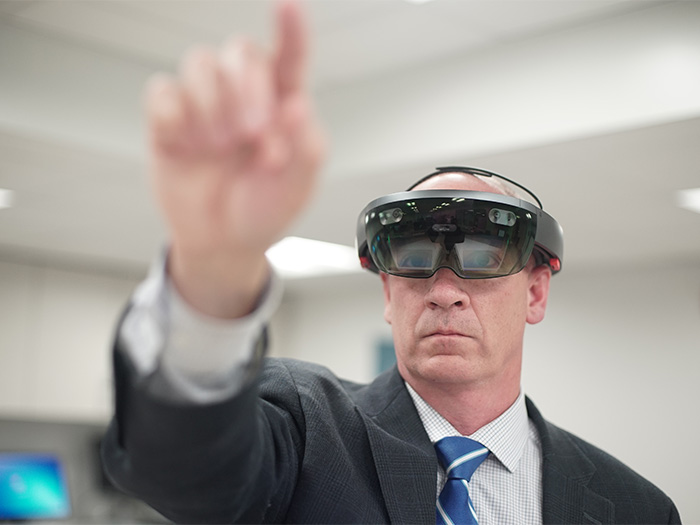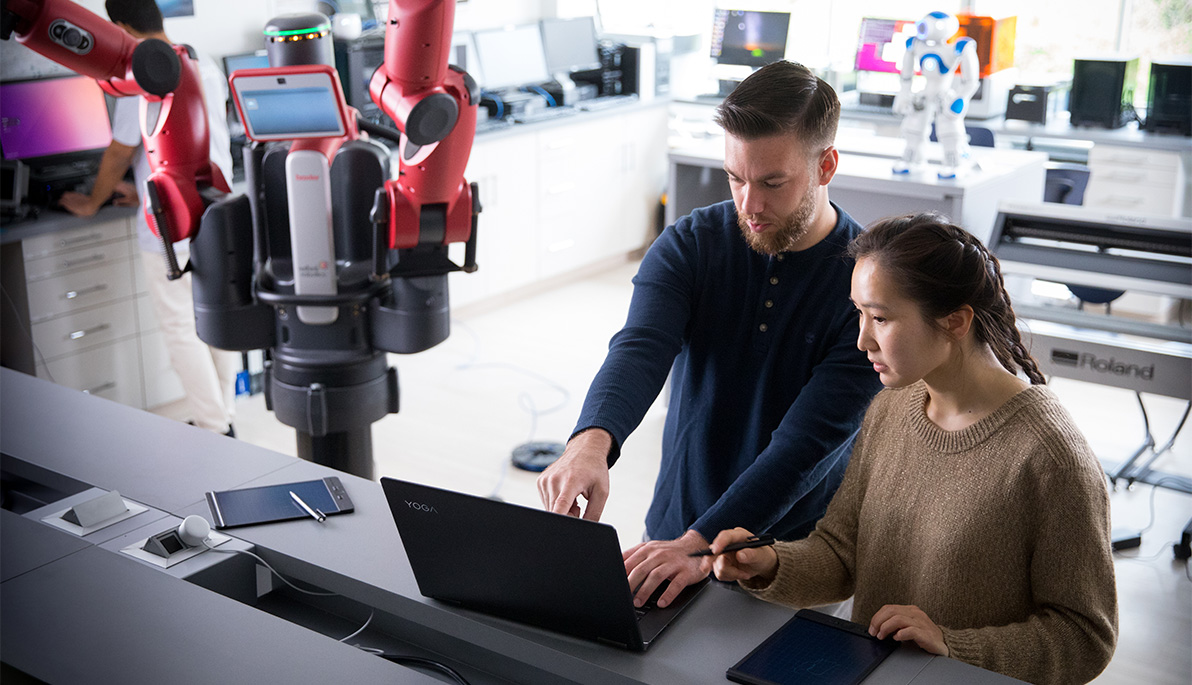
The ETIC: Making Things Happen
November 3, 2020
New York Tech's business and technology incubator, now five years old, continues to spur entrepreneurship and innovation, both on campus and off.
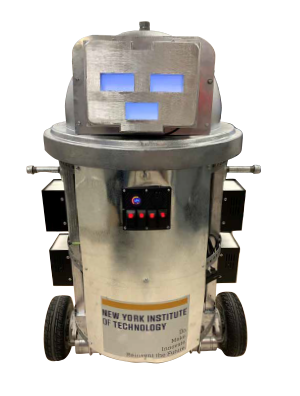
E.R.R.S.E.L.A. is a web-based robotics project, which allows students to contribute from any location based on their skill level and interests. Above: Early prototype of E.R.R.S.E.L.A
As a high school senior, Robert Doxey created his first app, a game for the iPhone that he made available through the iOS App Store. Three years later, the New York Tech computer science major is flexing his entrepreneurial muscles as the founder of DevTeam_One, a company that develops apps to meet the needs of other startup companies.
Doxey, a third-year student in the accelerated five-year bachelor/master’s program in computer science, credits New York Tech’s Entrepreneurship and Technology Innovation Center (ETIC), a campus-based business incubator, for helping him make his business a reality. “The ETIC is a huge benefit to students,” says Doxey. “A student may have an idea for a company or product but not have all the skills needed to develop it. That’s where the ETIC comes in, helping students obtain real-world experience as an entrepreneur.”
Partially funded by the U.S. Department of Commerce’s Economic Development Administration and the New York State Empire State Development Corporation (ESD), the ETIC was established in 2015 by Nada Anid, Ph.D., New York Tech’s vice president for strategic communications and external affairs in her former role as dean of NYIT College of Engineering and Computing Sciences with a team of faculty and a 25-member executive advisory board. Its mission is to foster innovation and promote collaborations between industry, the academic community, professional organizations, and government. As a source for talent, entrepreneurship, and innovation in technology, engineering, and applied science, the Center will spur economic growth and ensure greater competitiveness for Long Island and the broader metropolitan region, and support the region's economic development by focusing on the three critical areas: information technology and cybersecurity, bioengineering and health analytics, energy, and green technologies.
A Stop on Long Island’s Tech Corridor
In addition to bridging classroom learning to real-world applications at New York Tech, the ETIC builds on the university’s decades-long effort to develop Long Island’s tech corridor. Other area research institutions joining this initiative include the Feinstein Institutes for Medical Research, Northwell Health, Cold Spring Harbor Laboratory, and Stony Brook University, which also houses a New York state-certified business incubator.
“We’re contributing to the cluster of institutions and organizations focused on building a culture of innovation and economic development in the region,” says Nizich.
The ETIC, a designated START-UP NY tax-free zone and Empire State Development Division of Science, Technology and Innovation (NYSTAR) business incubator, allows businesses located there to operate free of state and local taxes for 10 years in exchange for job creation and regional investment commitments. Currently, 10 companies have signed space-use agreements and are benefiting from ETIC facilities and services. The ETIC also collaborates with more than 50 regional companies and organizations in various ways, including holding/co-hosting events, recruiting students for internships, sourcing subject matter experts for conferences, and acting as advisors and volunteers for the ETIC.
Another important role of the ETIC, which will be honored at the Long Island Summit Awards this October, is helping fledgling companies demonstrate, test, and advance new ideas and technologies, capitalizing on the talent and expertise of New York Tech’s students and faculty as well as ETIC’s equipment and state-of-the-art facilities.
Currently, Nizich is supervising graduate students working on a prototype and initial software for local start-up company, Grub Guard, which has developed a patented hardware and software solution to protect food deliveries from being compromised. New York Tech students Michael Campisi (M.S. ’19) and Akshay Dev (M.S. ’19) developed the electronic components, wrote the operational code for the prototype, and created the various physical device prototypes using 3-D printers located at the ETIC.
“Before news articles reported that one out of four delivery drivers admitted to eating customers' food, and well before the COVID-19 pandemic, we had an idea for a product and software that would allow customers to know if their food had been tampered with during the delivery process,” says company CEO Zachary Jones. He was referred to the ETIC by the Empire State Development Corp., and says that while he could have gotten assistance developing his prototype and software elsewhere, it might have cost upward of $500,000, money his new start-up didn’t have at the time.
“They assisted in creating our functional electronic prototype, including the web application, which collects critical data and provides specific details of a potential packaging breach,” said Jones. “Grub Guard is on track to be an industry disruptor. I can attribute a portion of that success to the assistance we received through the ETIC. [Our experience there] forced us to think outside the box and push the endless boundaries of where our brand and technology can go.”
“The vision behind the ETIC is to encourage creation and invention, confidence and risk-taking, and empower any business partner or student currently enrolled at New York Tech, or at any affiliated high school, to turn ‘an idea into a company’ with onsite and virtually accessible tools, equipment, mentoring, faculty expertise, business, legal, marketing, and outreach advice that includes a green room for sharing success stories with the wider community via short video clips,” says Anid.
In its 8,000 square feet of state-of-the-art labs and facilities on the Long Island campus, including a machine shop, class 10,000 clean room, nanofabrication facility, materials lab, and a cybersecurity lab funded in part by the ESD, the center serves two vital purposes: providing partner companies with technical support, business development, and commercialization guidance and access to potential funding through its investor networks. In the process, it also helps students become entrepreneurs and engage in transformative research and development in their fields.
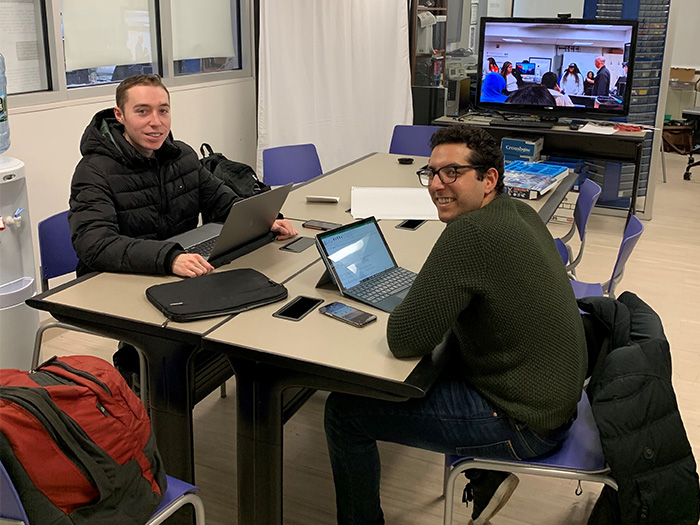 Graduate student Alex Atrachji’s app, UtiliWaste Connect, focuses on motivating people to separate food waste so it can be diverted from landfills. He is leveraging ETIC resources to develop his network software application and is using fellow student Robert Doxey’s company, DevTeam_One, to develop his app.
Graduate student Alex Atrachji’s app, UtiliWaste Connect, focuses on motivating people to separate food waste so it can be diverted from landfills. He is leveraging ETIC resources to develop his network software application and is using fellow student Robert Doxey’s company, DevTeam_One, to develop his app.Doxey got involved in ETIC activities as a first-year student, after learning about it from fellow student and physics tutor Mateusz M. Ardito-Proulx (B.S. ’20). They joined forces on an entry for the 2017 ETIC Design Challenge, taking third place for their app, One Earth, a game to educate kids about climate change. They subsequently competed in a second design challenge with an app to help citizens of developing countries locate drinkable water, food, and other resources, taking second place. Shortly after, Doxey founded DevTeam_One, which recently finished Phase I development of an app for UtiliWaste Connect, another ETIC company started by Alex Atrachji (ACERT ’20, M.S. ’20).
“Having my own company has enhanced my engineering education,” Doxey says. “I now know what it’s like to work with clients and make apps for them for pay.”
HANDS ON
While there are other business incubators in greater Long Island, the ETIC provides more than just business development and investment guidance. “Our differentiator is the technical support we can provide a startup company—from our students and faculty,” says Babak Beheshti, Ph.D., dean of the College of Engineering and Computing Sciences, home to the ETIC.
Indeed, creating an atmosphere for “high-impact entrepreneurial learning” was a major goal when ETIC Director Mike Nizich, Ph.D., was hired in 2016 by Anid.
“The original concept was that we were going to attract outside companies to come and live and breathe here,” says Nizich, who brought 20 years of industry experience in information technology and cybersecurity with him. “We don’t have the resources to provide year-round, 24/7 business support and campus access so that proved difficult.”
So Nizich focused on developing a prototyping and innovation center to give partners resources and students hands-on experience in software design, computer-aided design (CAD), software development, robotics, cybersecurity, and other in-demand areas. “We built out these areas so we could have students work on projects and build their expertise and skill sets.”
“It’s a maker fabrication space in the fullest sense,” adds Beheshti. “Students can engage in projects in any of the technical areas they are interested in.”
Students use the facilities to develop their own projects and sometimes even tackle ETIC projects for partner start-up companies. Nizich also maintains internal ETIC initiatives so that interested students, regardless of their major, have an opportunity to get involved.
The biggest project at the moment, and one that was ideally suited to the pivot to virtual learning in spring 2020, is the ETIC Research Robot for Student Engagement and Learning Activities, or E.R.R.S.E.L.A. A web-based robotics project, E.R.R.S.E.L.A. allows students to contribute from any location based on their own skill level and technology interests.
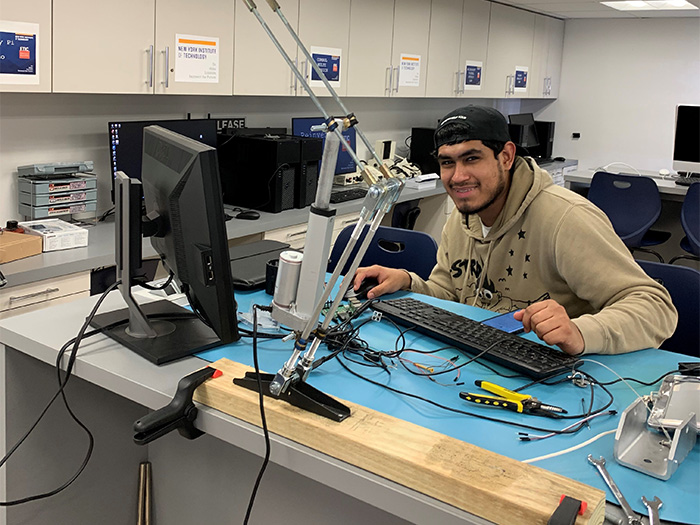 Computer science major Alex Vazquez-Zavala has spent much of the past year configuring electronics and code for E.R.R.S.E.L.A.’s robotic arms.
Computer science major Alex Vazquez-Zavala has spent much of the past year configuring electronics and code for E.R.R.S.E.L.A.’s robotic arms.Michael Campisi (M.S. ’19), for example, wrote the original Python operating system for E.R.R.S.E.L.A. Fellow computer science major Alex Vazquez-Zavala has spent much of the past year configuring electronics and code for the robotic arms. “I’m new to Python, so I’ve been learning as I go,” he says. “Working in phases makes it simpler. You need to make the arm move, so you do the research and make the arms move. Then you add the next step. This keeps building and making the robot better.” This experience ultimately helped Vazquez-Zavala secure an internship opportunity with Motiva, one of the ETIC’s supporters.
Another project involves developing health-care applications for the robot, such as pushing a wheelchair or delivering medication in a sterile hospital environment. “We have an intellectual property program and are starting to file provisional patents,” says Nizich.
The robot’s application programming interface (API) allows students, faculty, or teams of students to add capabilities to the robot’s sensors, actuators, software, or artificial intelligence, either on site at the ETIC or remotely from their homes or classrooms.
The remote operation also allows E.R.R.S.E.L.A. to function as a community outreach project. Nizich has engaged several high school teachers and their students on Long Island to develop E.R.R.S.E.L.A.-related applications. “We are introducing them to New York Tech and the ETIC, but the real point is to get them thinking that they could do this as a career,” says Nizich.
During the COVID-19 crisis, as many research programs were forced to disband, E.R.R.S.E.L.A.’s remote capabilities allowed students to continue their “hands-on” research. In April, Nizich launched the iNTEREST program (New York Tech’s ETIC Remote Engagement Sessions in Technology), twice-weekly Zoom seminars to help train new and current participants in skills related to the project, from developing software and web applications to creating databases. And in June, Nizich began a summer program for students and recent graduates with majors in computer science, electrical and computer engineering, mechanical engineering, and graphic design. That same month, E.R.R.S.E.L.A. also played a starring role in commencement, greeting new graduates, faculty, and guests at the College of Engineering and Computing Sciences virtual graduation ceremony.
“These uncertain times have provided us with the unique opportunity to transcend our traditional areas of expertise and coalesce around larger community-based initiatives,” says Beheshti. “This inherently multidisciplinary initiative around our robotics platform is precisely one that addresses this opportunity.”
FROM LAB TO MARKETPLACE
The ETIC Design Challenge Series was launched in 2018, fostering student motivation from a U.N. global development program to tackle socioeconomic challenges by developing new technologies that support clean air and water, human rights, and other issues known as the Sustainable Development Goals.
Using the U.N.’s Sustainable Development Goals gives all inventor-participants a similar focus and provides a mechanism for scoring and judging performances. During three levels of competition, participants are asked to explain their idea, make a whiteboard presentation, and then deliver a prototype and pitch video.
In addition to spurring innovation, Nizich says the competition is among several initiatives available for students to bolster their skill sets and résumés. Another, specifically for undergraduate researchers, is the Undergraduate Research and Entrepreneurship Program (UREP), providing students opportunities and funding to work on research or entrepreneurship projects in a group setting, under the guidance of faculty mentors.
“When students work in an environment like this, they’re already working at a commercial level, so we’re really servicing the business community. When industry needs computer scientists, or cybersecurity experts, or engineers, they know where to come.”—Mike Nizich, Ph.D.
Employers are already taking notice. “The ETIC has become an instrumental interface between our students and industry,” says Beheshti. Computer science major Campisi was offered a full-time position with Cybersafe Solutions; Northwell Health hired computer science major Salman Malik (M.S. ’19); and electrical and computer engineering major Nicholas Cariello (B.S.’18, M.S. ’19) and computer science major Vignesh Harish (M.S. ’18) are working at IBM’s cybersecurity division.
Peter Curtis (B.T. ’83, M.S. ’95), CEO of PMC Group, associate professor of energy management, and a member of the College of Engineering and Computing Sciences Executive Advisory Board, regularly recruits ETIC students. “I look for motivated students who want to make a difference,” he says. “The students involved at ETIC come in with a solid background and are able to jump pretty quickly into the things I need them to do,” he says.
The ETIC’s Technology Internship Prep Program (TIPP) was specifically designed to showcase ETIC students to potential employers. It challenges students to present a proven technology-creation portfolio and hosts showcases where employers can experience the creations and meet the creators.
From there, the next steps vary. At PMC, for example, after completing a series of professional development modules, students enter a paid internship program that teaches them the basics of mission-critical systems and operations. “ETIC is creating a culture where students are thinking out of the box, which is a really important skill set for the next generation,” says Curtis.
Partner Companies
- Chroma Projections LLC
- DevTeam_One*
- Excelsior Business Development
- Galaxy Gate*
- Grub Guard
- Marc Antoni Racing Corp.
- Sautech*
- TG Innovations (LIU Post)*
- U.S. Commercial Services
- UtiliWaste Connect*
- Mindless, Inc.*
* Student-founded company
Other ETIC-led activities offer real-world challenges. Twice a year, the ETIC sponsors daylong “hackathon” competitions, where students compete in a cybersecurity cryptography challenge. “Working with experts in the field and actually getting their hands dirty enriches students’ learning experience and broadens their knowledge base past the classroom,” says Nizich. And if they perform well, it’s a great addition to their résumé. “I’ve had top performers offered jobs on the spot,” he says.
Other students are using the ETIC to start their own businesses. “We’ve basically become the launchpad to commercialize their ventures,” says Beheshti.
Take UtiliWaste Connect, launched by Atrachji, which focuses on motivating people to separate food waste so it can be diverted from landfills. Atrachji is tapping ETIC resources to develop his network software application.
“The ETIC was the main reason I became a graduate student at New York Tech,” says Atrachji. “Its resources bring incredible opportunity to gain practical, hands-on experience to innovate. Being surrounded by other students working on cool projects and being able to learn and grow from one another has been an incredible experience.”
A Stop on Long Island’s Tech Corridor
In addition to bridging classroom learning to real-world applications at New York Tech, the ETIC builds on the university’s decades-long effort to develop Long Island’s tech corridor. Other area research institutions joining this initiative include the Feinstein Institutes for Medical Research, Northwell Health, Cold Spring Harbor Laboratory, and Stony Brook University, which also houses a New York state-certified business incubator.
“We’re contributing to the cluster of institutions and organizations focused on building a culture of innovation and economic development in the region,” says Nizich.
The ETIC, a designated START-UP NY tax-free zone and Empire State Development Division of Science, Technology and Innovation (NYSTAR) business incubator, allows businesses located there to operate free of state and local taxes for 10 years in exchange for job creation and regional investment commitments. Currently, 10 companies have signed space-use agreements and are benefiting from ETIC facilities and services. The ETIC also collaborates with more than 50 regional companies and organizations in various ways, including holding/co-hosting events, recruiting students for internships, sourcing subject matter experts for conferences, and acting as advisors and volunteers for the ETIC.
Another important role of the ETIC, which will be honored at the Long Island Summit Awards this October, is helping fledgling companies demonstrate, test, and advance new ideas and technologies, capitalizing on the talent and expertise of New York Tech’s students and faculty as well as ETIC’s equipment and state-of-the-art facilities.
Currently, Nizich is supervising graduate students working on a prototype and initial software for local start-up company, Grub Guard, which has developed a patented hardware and software solution to protect food deliveries from being compromised. New York Tech students Michael Campisi (M.S. ’19) and Akshay Dev (M.S. ’19) developed the electronic components, wrote the operational code for the prototype, and created the various physical device prototypes using 3-D printers located at the ETIC.
“Before news articles reported that one out of four delivery drivers admitted to eating customers' food, and well before the COVID-19 pandemic, we had an idea for a product and software that would allow customers to know if their food had been tampered with during the delivery process,” says company CEO Zachary Jones. He was referred to the ETIC by the Empire State Development Corp., and says that while he could have gotten assistance developing his prototype and software elsewhere, it might have cost upward of $500,000, money his new start-up didn’t have at the time.
“They assisted in creating our functional electronic prototype, including the web application, which collects critical data and provides specific details of a potential packaging breach,” said Jones. “Grub Guard is on track to be an industry disruptor. I can attribute a portion of that success to the assistance we received through the ETIC. [Our experience there] forced us to think outside the box and push the endless boundaries of where our brand and technology can go.”
This article originally appeared in the Fall 2020 issue of New York Institute of Technology Magazine.
By Renée Gearhart Levy
More Features

An Alumnus’ Commitment to the Environment
As an energy management graduate from New York Tech’s Vancouver campus, Jasdeep Gulati (M.S. ’22) is highly invested in educating people about environmental and climate sustainability.

Vancouver Faculty Win University-Sponsored Research Awards in New Program
The new Global Impact Research Grant (GIRG) program has been developed to keep Vancouver-based faculty connected to faculty and research projects being conducted on the university’s New York campuses.

Studying Climate Change One Degree at a Time
Junhua Qu (M.S. ’24) began her collegiate journey in Beijing. But, her interest in climate change took her to New York Tech’s Vancouver campus to study energy management.
